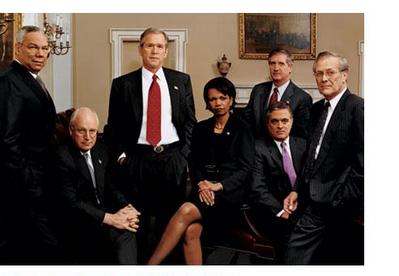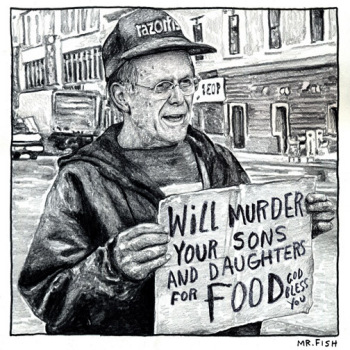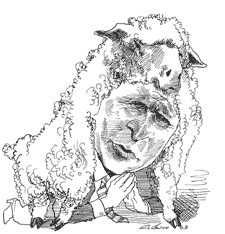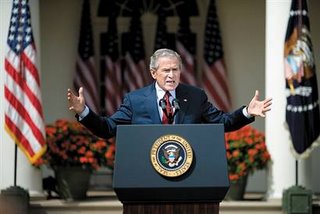
The striking photo of Bush's war cabinet in 2002 is the work of Annie Leibovitz.
All worldly pursuits have but the one unavoidable and inevitable end, which is sorrow: acquisitions end in dispersion; buildings, in destruction; meetings, in separation; births, in death. Knowing this, one should from the very first renounce acquisition and heaping-up, and building and meeting, and...set about realizing the Truth. Life is short, and the time of death is uncertain. So apply yourselves to meditation.
---Milarepa
All of us are apprenticed to the same teacher---reality. It is as hard to get the children herded into the car pool and down the road to the bus as it is to chant sutras in the Buddha-hall on a cold morning. One is not better than the other; each can be quite boring; and they both have the virtuous quality of repetition. Repetition and its good results make the very activities of our life into the path.
---Gary Snyder
The rain has stopped, the clouds drifted away,
the weather is clear again.
If your heart is pure, then all things in your world are pure....
Then the moon and flowers will guide you along the way.
---Ryokan
To the wisdom of these Buddhist poets let me add another piece of downhome advice: He who hesitates is lost. Addison said it I guess, and Oliver Wendell Holmes repeated it for American practicality...but I first heard it from a radio station engineer when I was a little boy. We were riding with my dad in the station van full of equipment up to Chautauqua, New York, for a network broadcast of the symphony. We were speeding toward the Erie railroad crossing just south of Ashville, and our driver could see a train was coming---but it was far enough away still that we could make it across. But our driver lifted his foot off the gas while he decided...and now it was too late. We sat there as the freight rolled by...and 'twas then the proverb got uttered. With all the drama of that moment, I've never forgotten the saying...and I'm thinking it today too.
It's the title of a Leadbelly song that graces this entry...and all this has to do with discussions stirring through the States on what we're going to see out of this new Congress. I'm dizzy with the possibilities...and really only want to point you thisaway and thataway as to what's up. But beware of hesitation!
I was surprised on Monday by a reply from Bob Sheak, Professor Emeritus of Anthropology and Sociology at OU, in which he laid out a laundry list of must-do items. I still was wondering What Now! but Bob urged we must begin pressure immediately. Certainly the anticipation is high, as newspapers give us articles on orientation the newly elected members are receiving in Washington right now. When have we ever learned or cared anything about that stuff? Here, with his permission, is what Bob had to say~~~
Hey Richard,
As always you've posted useful articles. However, the policy issues that are being discussed are rather timid in light of the major crises before us. Although I voted a straight-Democratic ticket, and I think the Democratic victories will have some positive effects over the next couple of years, I fear they may not be bold enough or they will lack the discipline to deal with many major problems. What they accomplish or try to accomplish may not be good enough. And, unlike in previous generations, some of the problems may not wait for minor reforms to enable us to avoid serious crises or catastrophes.
Over the next two years, they will stop the Bolton nomination and try to keep Bush from appointing ultra-conservative judges to the federal judiciary. They will advance legislation dealing with a minimum wage, stem cells, start some sort of discussion of the need for a new energy policy, try to fix some of the problems linked to the Medicare prescription law, somehow address the issues of the budget and trade deficits, and reign in the movement toward an imperial presidency. They will hold hearings on many of these issues and on Iraq-related questions. They will probably keep Bush from bombing or invading Iran. These are all worthy goals.
But some of the problems out there may not wait until 2008 or may not be addressed - or adequately addressed - and, even if a Democratic president is elected in 2008, may not even then be fully dealt with. Here are ten examples of big problems, interrelated in various ways, that concern me. One, they don't have a plan to reduce the budget deficit, and it represents a huge and immediate problem that may not wait until 2008. Two, they are currently steering clear of any commitment to raising taxes. Three, I don't see any clear Democratic plan to deal with Iraq. (And don't forget that the Democrats cannot count on Lieberman on this issue.) Four, the Democrats have not had much to say about reducing the military budget (there will be continuing pressures to increase it from the likes of McCain). Five, it's not at clear that they will adopt a nuclear weapons policy that reflects the spirit of the NPT and sets an example to the rest of the world. Six, they do not put forward a robust job creation policy, although something along these lines might come out of a discussion of the need for an energy policy based in part on renewables. Sherrod Brown's job creation policy is largely based on fixing our trade policy. Seven, it's not clear to me whether we can count on the Democrats to fix the election system, along the lines proposed, say, by The Nation's Vanden Heuvel ( http://www.thenation.com/doc/20061120/kvh ). Eight, we need some sort of one-payer based health care system that provides health care for everybody. The Democrats offer only incremental reforms. Nine, if Hillary Clinton is an example, the Democrats will do nothing meaningful to address the Israeli-Palestine conflict. Ten, It remains to be seen whether the Democrats can offer an energy policy that at once reduces carbon emissions, reduces our growing dependence on foreign oil, and provides a major boost to alternative energy and conservation.
Have a good week, Bob
As I wrote back to him, I would be content with just some rousing investigations about what this secretive administration has been up to all this time---and especially how much of our cash has been stuffed into greedy pockets. I realize how every second counts with some of these issues, but shouldn't we expose and discredit the opposition so thoroughly that 2008 will bring victory in the White House as well? Or would investigations just be hesitation? Yesterday TruthOut published the case for investigation~~~
Ten Reasons Congress Must Investigate Bush Administration Crimes
By Jeremy Brecher and Brendan Smith
t r u t h o u t Guest Contributor
Tuesday 14 November 2006
Few elections in history have provided so clear a mandate. As the New York Times put it, Democrats were "largely elected on the promise to act as a strong check on [Bush's] administration." (1) But the first response of the new Congressional leadership has been to proclaim a new era of civility and seek accommodation with the very people who need to be held accountable for war crimes and subversion of the Constitution.
Democratic strategists who argue for this kind of bipartisanship maintain that the American people want their political leaders to address the problems of the future, not pursue recriminations about the past. They therefore oppose the kind of penetrating investigation that a White House strategist told Time would lead to a "cataclysmic fight to the death" (2) if Democrats start issuing subpoenas. If such "peace at any price" Democrats prevail, the result will be a catastrophe, not only for the Democratic party but for American democracy.
Establishing accountability will require a thorough investigation of the actions of the Bush administration and, if they have included crimes or abuses, ensuring that these are properly addressed by Congress and the courts. The purpose of such action is not to play "gotcha" based on hearsay and newspaper clippings. Investigation, exposure, and even prosecution or select committee proceedings, should they become necessary, are primarily means for re-establishing the rule of law. But such investigations may be blocked by the Democratic leadership unless American citizens and progressive Democrats in particular demand them. Here are ten reasons why they should:
1. The US faces a Constitutional crisis that goes far beyond either partisan politics or isolated acts of wrongdoing. The Bush administration has tried to replace the Constitutional rule of law with the power of the executive branch to disregard both the laws established by the legislative branch and the judgments of the judicial branch. It has cloaked this power grab with a mantle of secrecy. Only by demonstrating the power of Congress to know what the executive branch does can even the possibility of Constitutional checks and balances be restored. The prerequisite for oversight is the right to know. Unless Congress successfully asserts that right, the Executive's usurpation of power will be permanent and unlimited.
2. The Democrats are in danger of walking into a death trap the Bush administration and the Republican leadership are setting for them. The Democrats won the election on ending the Iraq war and holding the president accountable. In the current courtship, they are being invited to come up onto the bridge of the Titanic and share responsibility for the catastrophe. If they do that, they will end up at the 2008 election with a disillusioned public (especially their own base) who give them equal blame for the war and its catastrophic consequences. As The Nation recently editorialized, "Democrats must not forget the voters' message. If they collaborate in allowing continued bloodletting in Iraq, they will pay the price themselves in future elections." (3)
3. Defending the Constitution by investigating breaches in the rule of law will allow Democrats to appeal to new bases of support among independents and others concerned about the rule of law. It provides a way of reaching out without selling out.
The potential for such a broad and powerful coalition is exemplified by a recent statement by the Constitution Project - which includes both liberals and conservatives like David Keene, Chair of the American Conservative Union - that hails the election result as "an opportunity to restore checks and balances." It says, "The president has asserted that he has virtually unrestrained authority and that Congress and the courts have none. Congress must exercise, and the president must respect, its constitutional obligation to legislate and conduct oversight on issues like NSA wiretapping, military commissions, the detention and treatment of 'enemy combatants,' habeas corpus, and the power to declare war." If the Republicans were able to win by running on the Bible, Democrats can do far better by running on the Constitution and restoring the rule of law.
4. Bush still holds most of the institutional cards on foreign policy, especially given his claims that the president can exercise authority without Congressional constraint. Short of an unlikely cutoff of funds, he can continue to conduct foreign policy and command the military as he chooses. Congress has few direct levers to impose Democratic proposals for new diplomatic initiatives or troop redeployments. It does not even have effective institutional means to stop further Bush administration adventures, such as an attack on Iran.
The key to establishing power over foreign and military policy is to so discredit the administration in the eyes of the public that neither Republican politicians nor the military, the intelligence agencies, the foreign policy establishment, or the corporate elite will allow it to continue on its catastrophic course. And that requires, not friendly negotiations with the White House to find a formula for bipartisan packaging of policy decisions Bush has already made, but a devastating exposure of the criminality, corruption, stupidity, and false premises of those who are making the decisions.
5. A Democratic Congress that fails to assert its prerogatives against the president will soon find itself losing the initiative in the face of the president's capacity to frame issues. While investigations are sometime portrayed as purely negative acts, by putting the administration on the defensive they may actually lay the groundwork for constructive Democratic proposals.
6. A majority of the American people and an overwhelming proportion of grass-roots Democrats want the president impeached. A mobilization for impeachment was kicked off last weekend with speeches by Elizabeth Holtzman, Cindy Sheehan, and others. Serious investigation of Bush administration malfeasance is probably the only way that Democratic leaders reluctant to pursue impeachment can avoid themselves becoming the target of this constituency. Indeed, impeachment advocates can be encouraged to direct some of their energy to supporting such investigations on the grounds that exposure of high crimes and misdemeanors might be the only way to put impeachment "on the table."
7. Exposing the truth about America's actions in the world over the past years, and holding those responsible for it accountable, is the prerequisite to setting relations with the world on a new, more constructive basis. As Philippe Sands, professor at University College London and a leading international human rights lawyer, puts it, "If the United States is to re-engage effectively with the rest of the world they have to resurrect accountability for their high officials."
8. The US government under the Bush administration has systematically and flagrantly violated national and international law. If the perpetrators of these crimes are given permanent impunity with the collusion of Congress, future law-breakers will assume that they can commit similar crimes with impunity. Whether or not Bush administration officials can be subject to criminal prosecution or impeachment, the exposure of their acts can subject them to the kind of public repudiation they deserve. That can begin setting us back on a track toward international law that restrains crimes by the leaders of all nations, however great or small. For as Antoine Bernard, executive director of the International Federation of Human Rights, has said, "The key to peace and democracy building world-wide is accountability for international crimes."
9. Hearings and investigations are crucial means to establishing institutional and cultural barriers to future crimes. At the close of the Vietnam war, the Church Committee established significant limits on executive authority, such as a strengthened Freedom of Information Act and a ban on assassination of foreign leaders. These were originally passed over the objection of then-presidential aide Dick Cheney, and he devoted his vice-presidency to dismantling them. Investigation of such executive abuses is the prerequisite for restoring public access to government information and developing new oversight mechanisms to enforce bans on torture, wiretapping, aggression, executive secrecy, and other illegal and unconstitutional executive activity.
10. Setting the public record straight about what has happened over the past six years is essential for re-establishing discourse based on reality that can be tested by evidence and argument, rather than on fantasy propagated by national leaders and amplified by their media sycophants. A respect for truth pursued through honest dialogue based on evidence and argument will be essential not only for beginning to heal the wounds created by Bush's illegal war of aggression, but for addressing problems like global warming that a fantasy-based public discourse has evaded.
52% of Americans believe that investigating the origins of the Iraq War is a high priority, and 58% want Congress to pursue contracting fraud in Iraq. (4) But that will not automatically translate into action by Congress. Convincing the Democratic leadership to support investigations will require sustained pressure from outside groups. This pressure needs to build early - before the new legislative session begins - so the leadership perceives efforts to squash committee action as politically hazardous.
Fortunately, progressive activists are elegantly positioned to mobilize such pressure. They were the troops on the ground for virtually every victorious Democrat. They can set up district meetings with members, organize phone banks for support calls, submit op-eds and letters to the editors, and organize town meetings on accountability. The time to start is now.
----------
(1) Robin Toner, "A Loud Message for Bush," New York Times, November 8, 2006.
(2) Karen Tumulty and Mike Allen, "It's Lonely at the Top," Time Magazine, October 29, 2006. Available at: {link:http://www.time.com/time/magazine/printout/0,8816,1552033,00.html}.
(3) Posted 11/9/06.
(4) Marcus Marby, "Are the Faithful Losing Their Faith?" Newsweek, October 21, 2006. Available at: http://www.msnbc.msn.com/id/15357623/site/newsweek/page/2/.
Jeremy Brecher is a historian whose books include Strike!, Globalization From Below, and, co-edited with Brendan Smith and Jill Cutler, In the Name of Democracy: American War Crimes in Iraq and Beyond (Metropolitan/Holt). He has received five regional Emmy Awards for his documentary film work. He is a co-founder of WarCrimesWatch.org. more...
Brendan Smith is a legal analyst whose books include Globalization From Below and, with Brendan Smith and Jill Cutler, In the Name of Democracy: American War Crimes in Iraq and Beyond (Metropolitan). He is current co-director of Global Labor Strategies and UCLA Law School's Globalization and Labor Standards Project, and has worked previously for Congressman Bernie Sanders (I-Vt.) and a broad range of unions and grass roots groups. His commentary has appeared in the Los Angeles Times, The Nation, CBS News.com, YahooNews and the Baltimore Sun. Contact him at smithb28@gmail.com.
http://www.truthout.org/docs_2006/111406L.shtml
And William Rivers Pitt published his review of the new Company-In-Charge, the Carlyle Group---which of course is the old company~~~
The Carlyle White House
By William Rivers Pitt
t r u t h o u t Columnist
Tuesday 14 November 2006
It was bad enough when the Carlyle Group bought Dunkin' Donuts last year, forcing millions of conscientious caffeine addicts to look elsewhere for their daily fix. Now, it appears Carlyle has added 1600 Pennsylvania Avenue to its formidable portfolio of acquisitions.
The Carlyle Group achieved national attention in the early days of the Iraq occupation, especially after Michael Moore's "Fahrenheit 9/11" exposed the firm's umbilical ties to the Bush family and the House of Saud. For the uninitiated, Carlyle is a privately-owned equity firm organized and run by former members of the Reagan and Bush Sr. administrations.
Currently, Carlyle manages more than $44 billion in 42 different investment funds, which is an interesting fact in and of itself: Carlyle could lay claim to only a meager $12 billion in funds in December of 2001. Thanks to their ownership of United Defense Industries, a major military contractor that sells a whole galaxy of weapons systems to the Pentagon, Carlyle's profits skyrocketed after the invasion and occupation of Iraq.
Some notable present and former employees of Carlyle include former president George H.W. Bush, who resigned in 2003; James Baker III, Bush Sr.'s secretary of state and king fixer; and George W. Bush, who served on Carlyle's board of directors until his run for the Texas governorship. One notable former client of Carlyle was the Saudi BinLaden Group, which sold its investment back to the firm a month after the September 11 attacks. Until the October 2001 sellout, Osama bin Laden himself had a financial interest in the same firm that employed the two presidents Bush.
How has Carlyle managed to acquire the White House? The newest edition of Newsweek begins to tell the tale in a story titled "The Rescue Squad": "Bush Senior has been relegated to watching all those political talk shows his son refuses to watch, wincing each time he hears his son's name being mocked or criticized. George H.W. Bush has been, in effect, sidelined by nepotism. He has repeatedly told close friends that he does not believe it is appropriate or wise to second-guess his son, or even offer advice beyond loving support. This time, however, was different. A source who declined to be identified discussing presidential confidences told NEWSWEEK that Bush 41 left 'fingerprints' on the Rumsfeld-Gates decision, though the father's exact role remains shrouded in speculation."
There is much more to this than Big George simply trying to shove Little George in a different direction, because Big George never travels alone. All of a sudden, two of the elder's main men - James Baker III and Robert Gates - are back in the saddle. Baker has spent the last weeks riding herd over the Iraq Study Group, a collection of old foreign policy hands tasked to come up with a solution to the Iraq debacle. Gates was a member of this group until he was tapped to replace Don Rumsfeld as Secretary of Defense. The Iraq Study Group is slated to produce some tablets of wisdom come December.
A third member of the Iraq Study Group, former congressman Lee Hamilton, is the rope that ties this curious historical package together. During the Reagan days, Hamilton was chairman of the committee investigating the Iran/Contra scandal that nearly submarined Reagan's presidency and haunted Bush Sr. until his defeat in 1992. In essence, Hamilton took Reagan's people at their word when they assured the chairman that neither Reagan nor Bush were "in the loop" regarding the arms-for-hostages deal.
History and investigation have proven this to be quite separate from the truth, and Hamilton later admitted he should not have bought what Reagan's people were selling. The fact remains, however, that Hamilton let these guys slip the noose during what was, at the time, an investigation into one of the most serious abrogations of Constitutional law in our history. It is worthwhile to note that the man who brought the most pressure upon Hamilton within Congress to be "bipartisan" and avoid a protracted investigation was then-Wyoming representative Dick Cheney.
One of the men spared prosecution in the Iran/Contra scandal, thanks in no small part to the gentility of Mr. Hamilton, was Robert Gates. Gates, then a senior official within the CIA, was widely believed to have been neck-deep in the plot. During the investigation into the scandal, Gates parroted Reagan and claimed not to remember when he knew what he knew about everything that was happening down in Ollie North's office. In 1991, he was nominated and eventually appointed to be the head of CIA by Bush Sr. During his confirmation hearings, according to the New York Times, it was revealed that "Mr. Gates [had] distorted intelligence reports so they would conform to the political beliefs of his superiors."
That sounds familiar.
Gates's nomination to the post of secretary of defense was field-generaled behind the scenes by James Baker III, who has suddenly taken on a muscular role within the Bush White House since the spectacular Republican wipeout during the midterm elections last Tuesday. Baker's return, along with the new prominence of Bush Sr., has been hailed in the mainstream press as a healthy step toward stability and sanity.
One is forced to wonder, however, which masters Mr. Baker is actually serving. Baker's Carlyle Group has profited wildly from the conflict in Iraq, which begs the question: will the bottom line, augmented by Carlyle's defense contracts, trump any attempts to establish a just and lasting peace? It must also be noted that Baker's law firm, Baker Botts, is currently serving as defense counsel for Saudi Arabia against a suit brought by the families of 9/11 victims. The connections between the Bush family and the Saudi royals has been discussed ad nauseam, and Mr. Baker is so closely entwined with the Bush clan that he might as well be a blood relative.
The weakening of George W. Bush, in short, has opened the door for an alumnus of the Iran/Contra scandal, Robert Gates, to gain control of the Pentagon - his nomination, as yet, has met with little Congressional resistance. This process was managed by James Baker, whose Carlyle Group made billions off the Iraq occupation and whose fealty to the American people has all too often taken a back seat to the needs and desires of the royal family of Saudi Arabia. These two, along with Hamilton, have been instrumental in crafting, by way of the Iraq Study Group, what by all accounts will soon be America's foreign policy lynchpin in Iraq and the Middle East as a whole.
Behind it all is George H.W. Bush, former employee of Carlyle, who has somehow managed to refashion his reputation into that of a grandfatherly, level-headed, steady hand, a foreign policy "realist" whose mere presence will soothe and calm the troubled waters we sail in. Unfortunately, his "realism" is a significant reason the United States finds itself in its current mess - until the Gulf War, Saddam Hussein was a boon confederate of both the Reagan and Bush administrations in their fight against Iran - and the team of experts he has brought with him have done more to undermine the national security of the country than any other three people one could name.
The winner in all this, of course, is the Carlyle Group. Meet the new boss, same as the old boss.
http://www.truthout.org/docs_2006/111406R.shtml
At the same time my friend here in Athens, Michelle Ajamian, sent out an update that featured an issue in danger of being overlooked by Democrats, third parties and Independents alike: our crappy election system. It's another article from yesterday~~~
Fixing The 2008 Election
Tova Andrea Wang, Jonah H. Goldman, The Century Foundation, 11/14/2006
The mainstream media in its instant analysis has proclaimed the election system worked surprisingly well in 2006. While it is true that no single catastrophe of election administration grabbed headlines this year, it is quite dangerous to suggest that the problems voters encountered on Election Day were not serious. As over 25,000 callers from across the country to the 866-OUR-VOTE voter information and protection hotline confirm, these problems led to thousands of eligible Americans being denied the opportunity to cast a ballot.
There’s a sense that the book is already closed on the 2006 election. But despite the nation’s attention now turning to the seismic political shift in Washington, several House races remain undecided. In Ohio, two of the races hinge on thousands of provisional ballots that likely were cast by legitimate voters but because of misguided and confusing election rules, will be thrown out, clearly affecting who wins the race. In Florida, it is likely that a problems with electronic voting machines caused far more votes to be lost than the current margin of victory.
While the case should not be overstated, it is critical that as we immediately enter the 2008 presidential election cycle, we undertake a more honest assessment of what happened in this election so we can concentrate on ensuring real, meaningful reform before the next federal election cycle. Only if we understand the problems that voters reported in 2006 can we enact real solutions that will move us toward a more fair and accurate system of elections.
Identification Problems
Over the past two years, the country has engaged in a national debate about how voters should identify themselves at the polls. Advocates for election reform and voting rights have shown that current protections, such as signature matches and severe penalties, strike an effective balance between protecting the rights of eligible voters to participate in the process and preventing ineligible people from manipulating the system. Unfortunately, partisanship has trumped reason as the states and the Congress are now grappling with unconstitutional legislation which hypes the false specter of voter fraud as an excuse for disenfranchising countless eligible voters.
On November 7, 2006, the result of this exaggerated concern over voter fraud was two-fold. First, in states like Arizona where restrictive voter identification requirements were operable, eligible citizens were prevented from casting a ballot because they did not have the requisite documentation. Second, a combination of confusion and lack of training forced voters to provide identification that was not required by law, resulting in many voters being turned away at the polls. In over a dozen states across the country, the Election Protection Hotline received complaints of poll workers asking voters for identification that was not required by law, wrongly forcing voters to cast provisional ballots, and otherwise misinterpreting the voting rules to prevent eligible voters from casting a ballot.
In Ohio particularly, poll workers improperly implementing identification requirements could have significant ramifications as two House seats remain undecided. The winner of those seats may well be elected by a margin smaller than those eligible voters who were either turned away, or who wrongly were forced to vote a provisional ballot that will not count. The most public example of this misapplication of Ohio identification requirements is Rep. Steve Chabot, who was wrongly turned away at the polls because his Ohio driver’s license did not have a current address. Although he was able to come back to the polling place and eventually cast a ballot, many ordinary Ohioans do not have the time to make multiple trips to the polls. Missouri’s Secretary of State Robin Carnahan was also improperly asked for photo ID and reported that her office got numerous complaints of similar incidents throughout the day.
Congress and state legislatures must pay more attention to the problems created by our election system and less to partisan proposals designed to remove eligible voters from the process. In addition, confusion about identification problems will be solved through better poll worker training.
Voting Machines
Problems with the administration of the election that could have been avoided instead created obstacles to efficient voting that have become increasingly familiar to voters across the country. In multiple states there were reports of people waiting in line for hours on end because of machine failures, poll workers who didn’t know how to operate the machines, insufficient numbers of voting machines and general poor administration of election systems. In Tennessee for example, too few machines in one jurisdiction led to waiting times of five and a half hours. In Prince George’s County, Maryland, voters stood in line for hours as poll workers struggled with voting technology and new voter registration procedures.
In all of these places, many voters left without casting a ballot. This denial of voting rights disproportionately impacts working people, especially those who have work or family duties that prevent them from having enough time on Election Day to stand on long lines or make multiple trips to the polls. There must be statewide standards for sufficient and equal distribution of voting machines, improved and standardized training and testing of poll workers, and increased resources to ensure sufficient numbers of machines and professionals operating them in every jurisdiction.
Across the country voters noticed that electronic machines “flipped” their votes when the vote summary screen indicated that the machine registered a vote for the opponent of their desired candidate. Elsewhere, voters complained that, despite going through the steps required by the machine, their vote for certain races never registered. Problems caused by inadequate procedures for making the best decisions about voting machines will be solved by demanding accountable, accessible and transparent voting technology.
Deceptive Practices
Voters also encountered problems before they even arrived at their polling place. Voters complained of cynical and fraudulent activities of both campaigns and individuals. In Orange County, California, a congressional campaign sent 14,000 voters with Hispanic surnames a letter advising recipients that “if you’re an immigrant, voting in a federal election is a crime that can result in incarceration,” or deportation. While illegal immigrants are barred from voting, legal immigrants who have become citizens are of course permitted to do so. In Virginia there were numerous reports of voters receiving calls telling them, falsely, that their polling place had changed, and telling them to go to the wrong precinct. Similar reports came in from New Mexico. In Colorado it was reported that Hispanics were getting phone calls telling them they were not registered and that they might be arrested if they voted. In heavily Democratic Maryland, materials were distributed statewide that suggested Republican candidates actually represented the Democratic Party, causing widespread confusion.
States and the federal government must do more to prevent and punish those who would commit this type of fraud. This means taking measures to directly criminalize such activity and requiring election administrators and elected officials to take proactive steps to ensure that voters are made aware of the deception and provided with the correct information immediately.
Voter Registration Problems
Voting rights advocates widely predicted that many voters would appear at the polling place to find their names not on the registration list. It was an easy prediction given the fact that many states were imposing unnecessarily high hurdles to registration. This included states requiring exact matches between voter registration information and information in existing state databases—despite the overwhelming evidence that much of that information is inaccurate because administration of both the registration rolls and other state databases is often inexact, frequently causing the names and other information in the databases to be incorrect. In other states, new registration requirements for proof of citizenship and rules virtually shutting down voter registration drives by civic organizations both reduced registration rates and made it more likely that voters would be left off the rolls.
On Election Day, voters from Georgia to California who were eligible to vote and submitted a timely voter registration form were turned away at the polls because their names did not show up on the registration lists. In some situations, these voters complained that they were not provided a provisional ballot.
These problems underscore the importance of fair and effective protocols for matching voter registration information and the elimination of rules requiring an “exact match”; the abolition of rules requiring proof of citizenship in order to register, when voters already must swear an oath under penalty of a felony that they are a citizen; and only reasonable rules governing third party voter registration drives, not rules that are meant to shut such worthy and essential services down.
Of course, Americans deserve better than what many thousands of them experienced on Election Day 2006. The infrastructure that supports our voting system should be strong and responsive to the will of the voters. Our democratic values demand that issues around election reform be considered outside of politics and the campaign cycle. In short, Congress and the states must move forward on meaningful reforms that strengthen citizen confidence in the system and expand access to all eligible Americans, as well as the resources necessary to make our democracy the model for the world.
Tova Andrea Wang is a Democracy Fellow at The Century Foundation. Jonah Goldman is the director of the National Campaign for Fair Elections. This article first appeared on TomPaine.com.
http://www.reformelections.org/commentary.asp?opedid=1440
Much to think about in these next days...and much to do. Undoubtedly the advice of the Buddhist poets should be heeded too, at least a few minutes a day. And if it is your preferred tradition, a prayer wouldn't hurt either.








